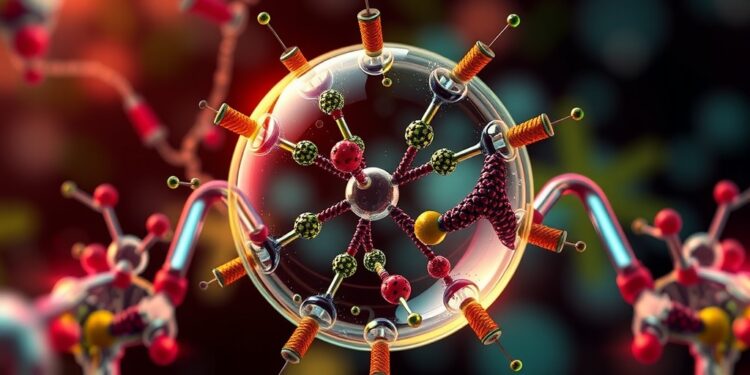
Oxidative Stress and Its Role in Non-Communicable Diseases: The Antioxidant-Enzyme Interplay
In recent years, the concept of oxidative stress has garnered significant attention due to its foundational role in the development of various non-communicable diseases (NCDs) such as cardiovascular diseases, diabetes, neurodegenerative disorders, cancer, and liver and kidney diseases. Understanding the biochemical interactions between reactive oxygen species (ROS) and antioxidants is crucial for developing strategies to mitigate the detrimental effects of oxidative stress on cellular structures. This imbalance between ROS and the body’s antioxidant defense mechanisms intensifies the pathogenesis of these conditions, leading to severe health outcomes.
The impact of oxidative stress can be observed at the molecular level, where ROS can cause extensive damage to lipids, proteins, and DNA. This oxidative damage ultimately triggers a cascade of cellular events that results in inflammation and cell death. The body’s defense system is equipped with enzymatic and non-enzymatic antioxidants that work synergistically to quench ROS and prevent cellular damage. While non-enzymatic antioxidants like vitamins C and E, carotenoids, and flavonoids can neutralize ROS directly, enzymatic antioxidants such as superoxide dismutase (SOD), catalase (CAT), and glutathione peroxidase (GPx) are crucial in metabolizing these reactive species into non-toxic forms.
The latest research highlights how the interplay between antioxidants and their enzymatic counterparts is more intricate and impactful than previously thought. For instance, non-enzymatic antioxidants have been shown to enhance the activities of enzymatic antioxidants, creating a robust network of defenses against oxidative stress. Vitamin C, for instance, not only scavenges free radicals but also reactivates vitamin E, another potent antioxidant, thereby bolstering the overall antioxidant capacity of the body. Similarly, bioactive compounds from plant sources, such as flavonoids and polyphenols, have been observed to modulate the expression and activity of antioxidant enzymes, further enhancing the body’s resilience against oxidative damage.
In the context of cardiovascular diseases, recent studies have demonstrated that flavonoids derived from fruits and vegetables significantly enhance the activities of SOD, CAT, and GPx. This enhancement not only alleviates ROS-induced vascular damage but also reduces the risks associated with atherosclerosis and hypertension. By inhibiting lipid peroxidation and inflammation, these antioxidants help maintain vascular integrity, providing a protective effect against cardiovascular complications linked to oxidative stress.
The relationship between oxidative stress and neurodegenerative diseases such as Alzheimer’s and Parkinson’s has also been a focal point of research. It is understood that neuronal cells are particularly sensitive to oxidative damage due to their high metabolic activity and lipid-rich membranes. Antioxidants like resveratrol and coenzyme Q10 (CoQ10) have shown promise in promoting neuronal survival by enhancing the activity of critical antioxidant enzymes. SOD and GPx play pivotal roles in protecting neurons from oxidative damage, while the actions of vitamin E in reducing peroxyl radicals have been linked to lower incidences of neurodegeneration.
Cancer is a complex area where oxidative stress plays a dual role. On one hand, ROS can induce DNA damage leading to mutations and tumorigenesis, but on the other hand, tumor cells often exploit antioxidant pathways to survive in hostile microenvironments characterized by high oxidative stress. Research suggests that while normal cells benefit from antioxidant protection, excessive levels of antioxidant enzymes in tumor cells may aid in their survival and resistance to chemotherapeutic interventions. Therefore, targeting specific antioxidant enzymes like SOD and GPx may enhance the efficacy of chemotherapy by increasing the susceptibility of cancer cells to oxidative damage.
In the realm of diabetes, oxidative stress not only impairs insulin signaling but also contributes significantly to complications such as diabetic neuropathy and nephropathy. Compounds rich in polyphenols and flavonoids have shown potential in enhancing the activities of SOD and CAT, facilitating better glucose metabolism and reducing oxidative damage. This suggests that dietary modifications rich in these antioxidants could serve as adjunctive therapies in managing diabetes and its related complications.
The impact of oxidative stress is not limited to singular conditions but extends to liver and kidney diseases as well. Both hepatic and renal tissues are exposed to oxidative stress that promotes inflammation and fibrosis, ultimately leading to organ dysfunction. Antioxidant therapies incorporating vitamins C and E, as well as polyphenolic compounds, have been indicated to support enzymatic antioxidant activity, mitigating disease progression. This highlights the importance of dietary and supplemental antioxidants in supporting organ health.
Given the growing understanding of the antioxidant-enzyme interactions, it is clear that emerging therapeutic strategies may hold promise for managing NCDs. Dietary interventions embracing foods rich in antioxidants can bolster the body’s intrinsic antioxidant defenses, while pharmacological agents activating the Nrf2 pathway show potential in enhancing the body’s response to oxidative stress. Gene therapy aimed at modulating the expression of antioxidant enzymes is another innovative approach that could revolutionize treatment protocols for conditions like cancer and neurodegenerative diseases.
As research in oxidative stress continues to evolve, it is evident that understanding these biochemical interactions is fundamental to developing effective therapies for NCDs. The quest for optimized antioxidant therapies necessitates a deeper exploration of molecular mechanisms underlying antioxidant-enzyme regulation. Future studies must endeavor to identify novel therapeutic targets, as well as develop precision medicine approaches tailored to individual oxidative stress profiles, thereby improving patient management.
Realizing the full potential of antioxidant-enzyme interactions presents an exciting frontier in the fight against non-communicable diseases. In advancing our knowledge in this field, we can make significant strides in the prevention and treatment of these diseases, ultimately aiming to reduce their global burden and enhance the quality of life for millions affected worldwide.
Subject of Research: Antioxidant-Enzyme Interaction in Non-communicable Diseases
Article Title: Antioxidant-enzyme Interaction in Non-communicable Diseases
News Publication Date: 25-Dec-2024
Web References: Journal of Exploratory Research in Pharmacology
References: DOI: 10.14218/JERP.2024.00020
Image Credits: N/A
Keywords: Antioxidants, Oxidative Stress, Enzymatic Antioxidants, Non-communicable Diseases, Cardiovascular Health, Neurodegenerative Diseases, Cancer Therapy, Diabetes Management, Dietary Interventions.
Tags: antioxidant-enzyme interactionsbiochemical pathways in oxidative damageenzymatic antioxidants in disease preventionglutathione peroxidase functionimpact of oxidative damage on healthinflammation and oxidative stress linkmechanisms of oxidative stress in cellular processesoxidative stress and non-communicable diseasesrole of reactive oxygen speciesstrategies to mitigate oxidative stresssuperoxide dismutase and healthvitamins as non-enzymatic antioxidants





